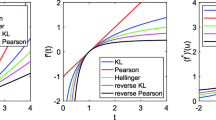Abstract
We consider a relaxation of the quadratic assignment problem without the constraint on the number of objects assigned to a specific position. This problem is N P-hard in the general case. To solve the problem, we propose a polynomial algorithm with guaranteed posterior accuracy estimate; we distinguish a class of problems with special assignment cost functions where the algorithm is 2-approximate. We show that if the graph in question contains one simple loop, and the set of assignment positions is a metric space, the proposed algorithm is 2-approximate and guaranteed to be asymptotically exact. We conduct a computational experiment in order to analyze the algorithm’s errors and evaluate its accuracy.
Similar content being viewed by others
References
Zabudskii, G.G. and Lagzdin, A.Yu., Dynamic Programming for the Quadratic Assignment Problem on Trees, Autom. Remote Control, 2012, vol. 73, no. 2, pp. 336–348.
Sergeev, S.I., The Quadratic Assignment Problem. I. New Lower Bounds in a Dual Assignment Scheme, Autom. Remote Control, 1999, vol. 60, no. 8, pp. 1162–1178.
Sergeev, S.I., The Quadratic Assignment Problem. II. Refined Gilmore–Lawler Algorithm, Autom. Remote Control, 1999, vol. 60, no. 9, pp. 1326–1331.
Muldoon, F., Polyhedral Approximations of Quadratic Semi-Assignment Problems, Disjunctive Programs, and Base-2 Expansions of Integer Variables, Clemson: Clemson Univ., 2012.
Saito, H. and Fujie, T., A Study of the Quadratic Semi-Assignment Polytope, Discret. Optim., 2009, vol. 6, pp. 37–50.
Voss, S., Heuristics for Nonlinear Assignment Problems, Combinat. Optim., 2000, vol. 7, pp. 175–215.
Malucelli, F., Quadratic Assignment Problems: Solution Methods and Applications, PhD Dissertation, University of Pisa, 1993.
Panyukov, A.V., Models and Methods for Construction and Identification Problems of Geometric Assignment, Doctoral (Phys.–Math.) Dissertation, Chelyabinsk, 1999.
Sahni, S. and Gonzalez, T., TP-complete Approximation Problems, ACM J., 1976, vol. 23, pp. 555–565.
Zabudskii, G.G. and Filimonov, D.V., On Minimax and Minisum Assignment Problems on Networks, Proc. XII Baikal Int. Conf. “Optimization Methods and Their Applications,” Irkutsk: ISEM SORAN, 2001, pp. 150–155.
Panyukov, A.V. and Pelzwerger, B.V., Polynomial Algorithms to Finite Veber Problem for a Tree Network, J. Comput. Appl. Math., 1991, vol. 35, pp. 291–296.
Bokhari, S.H., A Shortest Tree Algorithm for Optimal Assignments Across Space and Time in a Distributed Processor System, IEEE Trans. Software Eng., 1981, vol. SE-7(6), pp. 743–752.
Panyukov, A.V. and Shangin, R.E., An Exact Algorithm for Solving the Discrete Weber Problem for a k-Tree, Diskret. Anal. Issled. Oper., 2014, vol. 21, no. 3, pp. 64–75.
Shangin, R.E., A Deterministic Algorithm for Solving the Weber Problem for an n-Sequentially Connected Chain, Diskret. Anal. Issled. Oper., 2013, vol. 20, no. 5, pp. 84–96.
Stone, H.S., Multiprocessor Scheduling with the Aid of Network Flow Algorithms, IEEE Trans. Software Eng., 1977, vol. SE-3(1), pp. 85–93.
Burkard, E. and Pardalos, P., The Quadratic Assignment Problem, in andbook of Combinatorial Optimization, New York: Kluwer, 2000.
Malucelli, F., A Polynomially Solvable Class of the Quadratic Semi-Assignment Problems, Eur. J. Oper. Res., 1996, vol. 91, pp. 619–622.
Malucelli, F. and Pretolani, D., Quadratic Semi-Assignment Problem on Structured Graphs, Ric. Oper., 1994, vol. 69, pp. 57–78.
Malucelli, F. and Pretolani, D., Lower Bounds for the Quadratic Semi-Assignment Problem, Eur. J. Oper. Res., 1995, vol. 83, pp. 365–375.
Gallo, G., Tomasin, E.M., and Sorato, A.M., Lower Bounds for the Quadratic Semi-Assignment Problem, New Brunswick: Rutgers Univ., 1986.
Domschke, W., Schedule Synchronization for Public Transit Networks, ORSpektrum, 1989, no. 11, pp. 17–24.
Domschke,W., Forst, P., and Voss, S., Tabu Search Techniques for the Quadratic Semi-Assignment Problem, in New Directions for Operations Research in Manufacturing, Berlin: Springer, 1992, pp. 389–405.
Voss, S., Network Design Formulations in Schedule Synchronization, Computer-Aided Transit Scheduling, vol. 386 of Lecture Notes in Economics and Mathematical Systems, Berlin: Springer, 1992, pp. 137–152.
Voss, S., Tabu Search: Applications and Prospects, in Network Optimization Problems, Du, D.-Z. and Pardalos, P., Eds., Singapore: World Scientific, 1993, pp. 333–353.
Roupin, F., On Approximating the Memory-Constrained Module Allocation Problem, Inform. Proc. Lett., 1997, vol. 61, pp. 205–208.
Prim, R.C., Shortest Connection Networks and Some Generalizations, Bell Syst. Technic. J., 1957, vol. 36, pp. 1389–1401.
Kruskal, J.B., On the Shortest Spanning Subtree of a Graph and the Traveling Salesman Problem, Proc. Am. Math. Soc., 1956, vol. 7, pp. 48–50.
Gimadi, E.Kh., Glebov, N.I., and Perepelitsa, V.A., Algorithms with Bounds for Discrete Optimization Problems, in Problemy Kibernetiki (Cybernetics Problems), Moscow: Nauka, 1975, vol. 31, pp. 35–42.
Panyukov, A.V. and Shangin, R.E., Approximate Algorithms for Constructing a Minimal Spanning k- Tree, Proc. XII Russ. Sem. Control Problems VSPU-2014, Moscow, June 16–19, 2014, pp. 2338–2351, http://vspu2014ipuru/proceedings/vspu2014zip.
Shangin, R.E., Pardalos, P.M., and Panyukov, A.V., Heuristic Algorithms for Constructing a Minimal Spanning k-Tree, Proc. XVI Baikal Int. School–Seminar “Methods of Optimization and Their Applications,” Irkutsk: ISEM SORAN, p. 122.
Shangin, R. and Pardalos, P., Heuristics for Minimum Spanning k-tree Problem, Procedia Comput. Sci., 2014, vol. 31, pp. 1074–1083.
Shangin, R.E., Exact Algorithm for Solving Discrete Weber Problem for a Cycle, Prikl. Diskret. Mat., 2013, no. 4, pp. 96–102.
Author information
Authors and Affiliations
Corresponding author
Additional information
Original Russian Text © A.V. Panyukov, R.E. Shangin, 2016, published in Avtomatika i Telemekhanika, 2016, No. 7, pp. 103–112.
This paper was recommended for publication by P.Yu. Chebotarev, a member of the Editorial Board
Rights and permissions
About this article
Cite this article
Panyukov, A.V., Shangin, R.E. Algorithm for the discrete Weber’s problem with an accuracy estimate. Autom Remote Control 77, 1208–1215 (2016). https://doi.org/10.1134/S0005117916070079
Received:
Published:
Issue Date:
DOI: https://doi.org/10.1134/S0005117916070079




